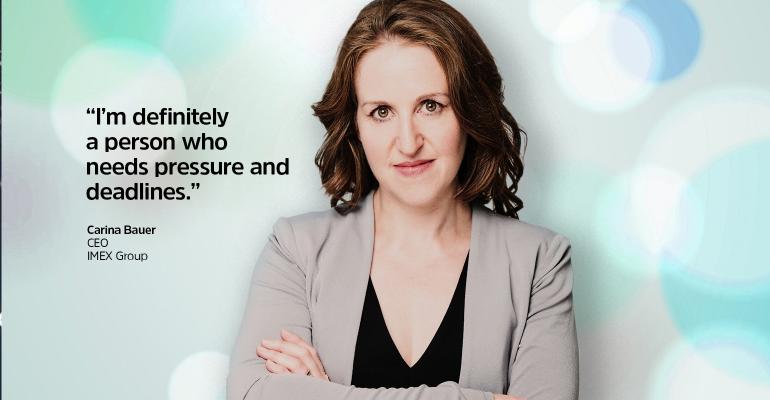For Carina Bauer, CEO at IMEX Group, productivity is a reflection of the passion we bring to our work. But like any efficient machine, tune-ups are a must. “Everyone has ups and downs in terms of motivation but at the end of the day we like to feel that there’s some purpose in the work that we do. I think if you find yourself in a situation where you’re wondering why you’re working so hard, you have to take time to step back to question what you’re doing and why.
“Often, we just need to recalibrate a bit, and if you re-look at how you are achieving your work, you would start to enjoy it again much more. In my position, I’ve had to constantly recalibrate what work I’m doing and how I’m doing it—not just for the business but for my sanity as well. You do that, and it’s good for a while, and then you have to do it again. It’s kind of never over,” she says, noting that she’s not alone. “When I look around me at people who are successful, they all do it.”
In-box Strategy
“I’ve gone through so many different ways of managing my tasks and emails, and what it comes down to is that everything has to be in one place and, for me, that place is my in-box in Outlook.” Bauer’s folders include specific meetings, topic areas, and department heads. “If something isn’t urgent, I immediately categorize it to a topic area or a person that a meeting is coming up for. Even if something is months old, it stays in the inbox until it’s resolved, but it’s not floating around in my in-box with me not know what I’m doing with it.”
Productivity Tip #1
“If I think about something that has to get done, I email myself and categorize it. It means I don’t forget things easily.”
Productivity Tip #2
“Over the past year I’ve removed notifications from Outlook. That has definitely helped my productivity.”
Can’t Live Without
Bauer is a dedicated Evernote user. She relies on it for taking notes during meetings and then she organizes the notes in folders similar to her Outlook folders. “So, for example, if I’m having a meeting with a sales team, I’d have all my notes from every meeting on Evernote. Whether it’s a call or a face-to-face meeting, the notes are there, rather than on a pad of paper. I can easily go back and see what was discussed, even over a number of years.”
Group Sharing
“Basecamp is really good for group discussion and sharing documents. For example, our PR teams are based in offices in Brighton, London, Germany, and the U.S. For a press release, we’ll start a discussion in Basecamp. The draft will be uploaded, then I can go in and edit it. It’s very transparent. It’s easy to see what the latest version is and any comments. We can also invite third parties into a specific discussion.”
Project Management
“We use Smartsheet for all our deadline-based collaboration,” Bauer says, noting that it has more functionality than Google Docs. “In Smartsheet, each action item can be assigned to a different person with deadlines.” She likes the fact that the system will send individual reminders, and that team members can note, as a percentage, how far they are toward completion of a task. “We can have a project map for almost the entire show for all the teams in Smartsheet. It looks like an online Excel spreadsheet, but with a hit of a button it goes to a calendar view, which can be filtered based on things that are just assigned to you, or your department, and you can also upload documents to it as well.”
Personal Style
“I’m definitely a person who needs pressure and deadlines, so I get very productive before each show and my productivity goes down after the shows. I can feel it. I’m someone who has to create pressure through different types of deadlines. I think people who thrive in exams probably thrive in events because it’s that same kind of deadline pressure.
“Some of my team are massively more productive than me. On the other hand, I’m capable of getting a lot of different things done in a day. I can switch from something quite strategic to something quite granular very quickly and I can get lots of different types of things done.
“A lot of my time is spent in meetings and on calls, that’s probably my most difficult balance—it’s my job to have those meetings so other people can do their job, but it’s difficult to keep up with the emails and the more detailed work that I also have to do, and that’s what leads to weekend and evening work.”
Click here for more productivity profiles!





